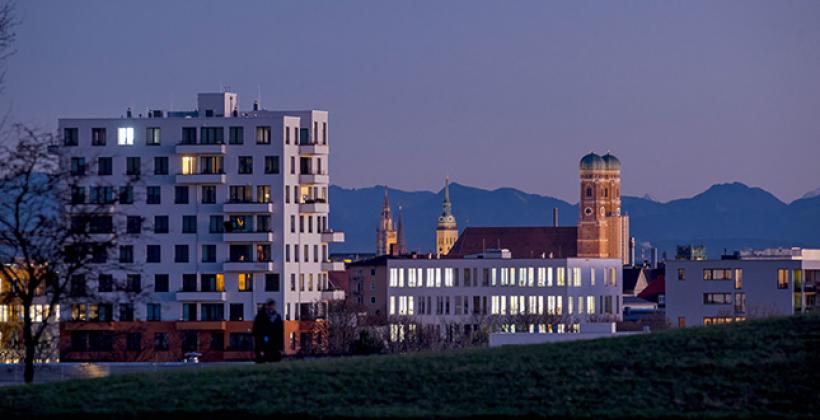
Location
Description
The Munich lighthouse demonstration area within the SMARTER TOGETHER project is located at the western edge of the city, and includes both the large urban redevelopment area Neuaubing-Westkreuz and the flagship new development area Freiham, set to become a model of low-carbon development for up to 20 000 new residents and 7 500 new jobs. With the aid of cutting-edge technology and the intelligent use of data, Munich’s objectives are to cut CO2 emissions by more than 20 %, raise the use of renewable energy to above 20 % and increase energy efficiency by more than 20 %. Neuaubing-Westkreuz/Freiham aims to be CO2-neutral by 2050.
Demo Site Expected Impact
* Detailed information regarding the technical and financial performance will be available at a later stage.
Within the SMARTER TOGETHER project, Munich strives to:
- refurbish an area of 42 000 m² in order to reduce energy consumption;
- develop 109 kWp photovoltaic system and install a battery storage, both connected to the virtual power plant;
- construct multimodal mobility stations with multifunctional district sharing boxes that increase e-mobility and serve as exchange and delivery stations for goods;
- install smart street lamps that consume less energy and facilitate new services;
- implement open, secure and city-wide smart data platform acting as a virtual data backbone for collecting city data in the domains of mobility, energy, urban living and crowd data.
- measure and collect temperature and humidity data in up to 400 flats in the redevelopment area via smart home solution and provide users with an individual and secured access to their collected data via a mobile app (Wohlfühl-App);
- widen the use of the offerings described above.
Within the SMARTER TOGETHER project, the city of Munich will invest a total of EUR 20 million in the district. The EU will fund the project with EUR 6.85 million. The estimated savings amount to 2785 MWh of primary energy per year and an annual reduction of 971 tonnes of CO2.
Technologies
Buildings and energy
* Detailed information regarding the technical and financial performance will be available at a later stage.
The planned implementations in Munich are:
Energy efficiency in buildings
- Retrofitting the building envelope
- Holistic rehabilitation of housing stock in public and private ownership (energy-efficient, high-standard renovation of 42 000 m2 floor space), while preserving current rent levels
Energy systems integration
- District heating and cooling
- Construction of low-energy districts based on renewable district heating (geothermal and low-temperature district heating) and renewable energy
- Near-to-surface geothermal energy
- Smart street lighting
- Smart lamppost connected to the urban data platform, which be available in two versions - 10 m for usage on road side and 3 m in green spaces and public parks. This should lead to more public services in the district, support safety, reduce energy consumptios. The lamps will offer sensor-based innovative solutions within the lighting infrastructure such as adaptive lighting, parking, free WiFi, etc.
Mobility & Transport
- Clean fuels and fuelling infrastructure
- Construction of multimodal mobility stations to increase the use of e-mobility and serve as exchange and delivery stations for goods
- Integration of 2 charging stations in lamp posts
- Electric, hybrid and clean vehicles
- E-trikes and cargo pedelecs in bike sharing scheme
- Car sharing
- Provision of e-cars for an existing car-sharing scheme.
ICT
- Urban data platform
- Upgrade of the city platform into a smart data platform
- It will be the basis for a holistic view of city data and will be operated under the trustworthy control of the public authority to offer security and quality. The platform will receive data, for example, from the sensor infrastructure installed with the open urban labs, and from sensors used within the smart home solutions of the refurbished flats, and can be used for developing smart services. To address the necessary regulations a so-called "data gatekeeper" concept is developed. It defines common usage, legal aspects (data privacy and security), operations and management process. The concept builds a framework for a trustworthy and open solution and is used as a blueprint to support replication and the development of an ecosystem of smart services.
- Creation of integrated infrastructures for smart data management platforms and smart services (e.g. intelligent lamp posts, local goods distribution centres, shared economic services, apps, etc.).
- Installation of 400 plug and play smart home solutions and connection to the data platform
- Mobile applications for citizens
- Smart city application giving access to services developed within the project, as well as standard functions like authentication, payment and access control. The app connected will allow users with smart home solutions to observe their individual data and to compare their own measured data with the average of the measured results of all project participants.
Building aspects
- Building Energy Services
- heating and DHW
- Building Energy Services
- lighting and appliances
- Installed Renewable Energy Sources
- photovoltaic
- Technology used to supply the buildings
- boiler
- Technology used to supply the buildings
- district heating (DH) network
- Technology used to supply the buildings
- electrical equipment
Energy Carriers
- Domestic gas - grid-bound
- Electricity
- Heat/district heat
- Light oil
- Solar thermal energy
Mobility Type of Intervention
- Vehicles
Thematic Field
- Energy System(s) Integration
- Information and Communication Technologies
- Mobility and Transport
- New Building(s)
- Refurbished Building(s)
